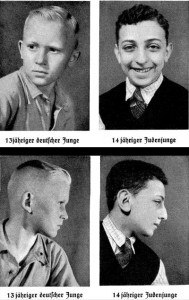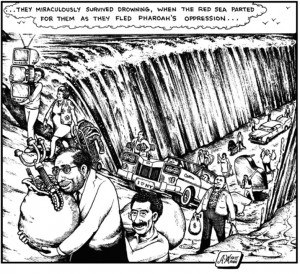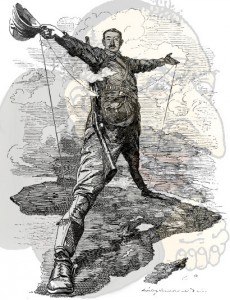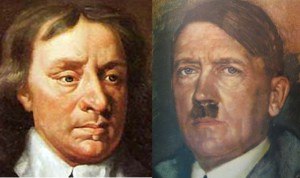Podcast: Play in new window | Download

“Whenever I hear the word ‘culture’ I reach for my gun.” is the transliteration to English of a phrase used by Hanns Johst, a German playwright and SS officer. The more direct translation from German would be, “When I hear culture…I unlock my Browning.”
The meaning is clear enough from the context in which the phrase is used – an angry reaction to the perception of a swindle, a fraud, especially when perpetrated by deceitful use of words or concepts.
When I read Yockey’s thoughts on culture and race…I reach for my gun.
Picking up in Imperium, page 281, in the section titled “Race, People, Nation, State”:
From this point the fundamental misunderstanding of the 19th century materialistic interpretation of race appears clear and distinct:
282
Race is not group anatomy;
Race is not independent of the soil;
Race is not independent of Spirit and History;
Races are not classifiable, except on an arbitrary basis;
Race is not a rigid, permanent, collective characterization of human beings, which remains always the same throughout history.
The 20th century outlook, based on facts, and not on the preconceptions of physics and mechanics, sees Race as fluid, gliding with History over the fixed skeletal form determined by the soil. Just as History comes and goes, so does Race with it, bound in a symbiosis of happening. The peasants now tilling the soil near Persepolis are of the same race as those who planted or roamed there a thousand years before Darius, regardless of what they were called then, or what they are called now, and in the time between, a High Culture fulfilled itself in this area, creating races now gone for ever.
This last error — the confusing of names with unities of history or race — was one of the most destructive made by 19th century materialism.
Yockey makes a combination of fallacious, misleading and simply wrong assertions here, most of which we have previously addressed.
Race is only partly anatomical, there are characteristic mental/personality traits as well. Race is only weakly influenced by “soil”, usually over the course of many generations. “Chinatown” is a one word argument for that. As with species, race is classifiable on an objective basis. Racial characteristics cluster at a range of scales, especially when correlations between traits are considered. Contrary to Yockey, it is not science or rationalism which promotes the false notion that race (or species) are rigid and permanent. This is more properly attributed to dogmatic religious beliefs such as creationism.
If the present-day inhabitants of Greece have the same collective name that the population of the same area had in Aristotle’s time, is anyone deceived into thinking that there is historical continuity? Or racial continuity?
Yes, just about everyone is deceived by name games.
As far as the Race-History symbiosis is concerned, names are accidental. They do not indicate any sort of inward continuity by themselves. The same is true of language.
Once the idea is grasped that what we call history really means High History, that this is the history of High Cultures, and that these High Cultures are organic unities expressing their inner possibilities in the profuse forms of thought and happening which lie before us, a deep understanding follows of the way in which History uses whatever human material lies to hand for its fulfillment. It puts its impress on this material by creating historical units out of groups hitherto often very
284
[d]iverse biologically.
We see just how lopsided in favor of Amorphous Abstractions and against “human material” Yockey was, imagining more substance and agency in the former than the latter.
We have seen that Race influences History as well as the converse. We come to the hierarchy of races.
The materialists could, of course, not succeed with all their attempts to make an anatomical classification of races. But races can be classified according to functional abilities, starting from any given function whatever. Thus a hierarchy of races can be based on physical strength, and there is little doubt that the Negro would stand at the top of such a hierarchy. There would however be no point in such a hierarchy, because physical strength is not the essence of human nature in general, and even less of Culture-man in particular.
For some insight on Yockey’s attitude toward the negro consider this bit of biographical information from Alex Kurtagic’s Remembering Francis Parker Yockey 18 September 1917 – 16 June 1960):
In 1935 he was involved in a car accident, which led to his being assaulted by several Afro-Americans and losing his front teeth. According to a local newspaper, he was hospitalised, but released the following day. The incident shaped his racial views thereafter.
Continuing with Imperium, page 285:
The fundamental impulse of human nature — above the instincts toward self-preservation and sex, which man shares with other Life-forms — is the will-to-power. Very seldom is there any struggle for existence among men. Such struggles as do occur are nearly always for control, for power. These take place within couples and families, clans, tribes, and among peoples, nations, States. Therefore the basing of a hierarchy of races on strength of will-to-power has a relation to historical realities.
When I hear human nature…I reach for my gun. Yockey himself had earlier warned against this idea. At page 202, just before the section we discussed in Yockey on Liberalism – Part 2 he writes:
The name “humanity” became thus a polemical word — it described everyone except the enemy.
. . .
But yet the word humanity excludes no one, semantically speaking. The enemy is also human. Therefore humanity can have no enemy, and the “one State” liberals and the “humanity” intellectuals were involved in the very sort of thing they wished to abolish — politics and war. “Humanity” was not a peace word, but a war slogan.
We come to the fundamental disjunction between political thinking and mere thinking about politics. All intellectualistic thinking about politics posits a certain great non-existent characteristic of human nature.
204
The Two Political Anthropologies
The touchstone of any political theory whatever is its attitude to the fundamental ethical quality of human nature. From this standpoint there are only two kinds: those which posit a “naturally good” human nature, and those which see human nature as it is on the other hand.
When I hear the word will-to-power…I reach for my gun. The positing of certain great non-existent characteristic of human nature – like will-to-power – is typical of the philosophizing I’ve encountered since digging into Yockey.
Will to power:
The will to power (German: der Wille zur Macht) is a prominent concept in the philosophy of Friedrich Nietzsche. The will to power describes what Friedrich Nietzsche may have believed to be [[[the main driving force in humans: achievement, ambition, the striving to reach the highest possible position in life]]]; these are all manifestations of the will to power. However, the will to power was never systematically defined, and its interpretation has been open to debate.
Having derived the “will to power” from three anti-Darwin evolutionists, as well as Dumont, it seems appropriate that he should use his “will to power” as an anti-Darwinian explanation of evolution. He expresses a number of times[21] the idea that adaptation and the struggle to survive is a secondary drive in the evolution of animals, behind the desire to expand one’s power—the will to power.
Back to Imperium again, where Yockey explicitly identifies the men behind the “19th century materialism” he condemns:
Such a hierarchy can have, of course, no eternal validity. Thus the school of Gobineau, Chamberlain, Osborn and Grant was on the same tangent as the materialists who announced that there is no such thing as Race, because they could not discover it with their methods. The mistake of the former was to assume the permanence — backwards and forwards — of races existing in their time. They were treating races as building-blocks, original material, and ignoring the connections of Race and History, Race and Spirit, Race and Destiny. But at least
286
they recognized the existing racial realities of their time, their sole mistake consisting in regarding these realities as rigid, existing rather than becoming. There was also in their approach a remnant of genealogical thinking, but this sort of thinking is intellectual and not historical, for History uses the human material at hand without questioning its antecedents, and in the process of using it, this human material is placed in relation to the vast, mystical force of Destiny. This remainder of genealogical thinking tended to create divisions in thought between Culture-peoples corresponding to no divisions in actuality. The further materialistic tendency developed to extend the principles of heredity which Mendel had worked out for certain plants to the subject of human Race. Such a tendency was doomed to be fruitless, and after almost a century of barren results, it must be abandoned in favor of the 20th century outlook which approaches History and its materials in the historical spirit and not in the scientific spirit of mechanics or geology.
Nevertheless the school of Gobineau at least started from a fact, and this brings it much closer to Reality than the learned fools who looked up from their rulers and charts to announce the demise of Race.
Yockey wasn’t ignorant. He was an intelligent and knowledgable man who rejected the material, biological reality of race. In making his argument he went beyond simple denial. He explicitly named the most prominent advocates of race science and he misrepresented their arguments. Yockey distorted the truth. He claimed the racialists had produced no results. He strawmanned their premise as “permanence” and their interests as purely materialist.
Yockey was the one “on the same tangent”, or to be more blunt, on the same side as the prototypical anti-“racists”. Like the anti-“racists” Yockey opposed the scientific understanding of race rooted in genealogy, in biology. He used the same fraudulent style of argument they did, posturing as if he were advocating facts and reality even as he was actually contradicting them.
As much as Yockey talked about spirit, he failed to note the quintessentially European spirit, the objective, inquisitive, rational and honest Aryan nature which inspired the racialists he named. He also failed to recognize the deceptive spirit of their antagonists, the very jewish nature of the anti-“racist” Boasian cultural anthropologists he did not bother to name. He exaggerated and thus distorted the anti-“racist” argument too, giving the false impression that his ideas and arguments about race were distinct from theirs. But they were in fact very similar.
Like the Boasian anti-“racists”, Yockey did not assert that race does not exist. They undermined race by redefining it and attacking it’s significance. They argued that science had shown race is arbitrary, impermanent, not deeply rooted in biology, when in fact science was (and still is) increasingly revealing exactly the opposite. They argued the primacy of culture. They asserted that race is a product of culture, a mere “social construct”.
Yockey was not simply wrong about race. He was profoundly, fundamentally wrong. He argued against a biological understanding of race in the same way and to the same end as the jews, a racial group which is biologically distinct from and implacably hostile toward Whites/Europeans/Aryans, and whose parasitic interests are served by such obfuscation and disguise.
Though the work of the racialists Yockey disparaged pre-dated his by up to a hundred years, their understanding of race was closer to the truth, more in touch with fact and reality than his.
Arthur de Gobineau is best known for his book The Inequality of Human Races, published in 1853. On page 121 Gobineau directly contradicts of Yockey’s assertions about the influence of soil on race:
After the Arabs, I will mention the Jews, who are still more remarkable in this connexion, as they have settled in lands with very different climates from that of Palestine, and have given up their ancient mode of life. The Jewish type has, however, remained much the same ; the modifications it has undergone are of no importance and have never been enough, in any country or latitude, to change the general character of the race.
Houston Stewart Chamberlain is best known for his book Foundations of the Nineteenth Century. Here is Chamberlain’s view on the “permanence” of race:
The Aryan, or ‘noble’ race was always in the process of creation as superior peoples supplanted inferior ones in evolutionary struggles for survival.
Also:
Adolf Hitler was an avid student of his “Foundations”, and praised him as “The Prophet of the Third Reich”
Henry Fairfield Osborn, Jr. was a prominent paleontologist, eugenicist and “distinguished Aryan enthusiast”. He was a conservationist, longtime president of the New York Zoological Society, and son of Henry Fairfield Osborn, who was a geologist, paleontologist, and eugenist, and the president of the American Museum of Natural History.
And finally, Madison Grant:
is most famously the author of the popular book The Passing of the Great Race in 1916, an elaborate work of racial hygiene detailing the “racial history” of Europe.
Grant’s work was embraced by proponents of the National Socialist movement in Germany; Passing was the first non-German book ordered to be reprinted by the NSDAP when it took power, and Adolf Hitler wrote to Grant that, “The book is my Bible”.
Yockey has long passed as an eccentric type of spiritualist-racialist, a sympathizer and apologist for national socialism. Yet he opposed and argued deceptively against fact, against reality, against the very understanding of race which underpinned national socialism. In this respect, Yockey was in fact a charlatan.





